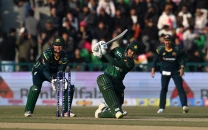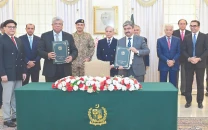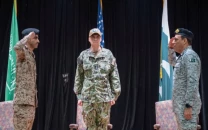Lacklustre progress in tracing out missing persons as cases pile up
PHC has often asked both govts for reports on whereabouts of missing persons.

PHC has often asked both govts for reports on whereabouts of missing persons. PHOTO: FILE
Over the recent past, the Peshawar High Court (PHC) expressed its displeasure on numerous occasions over a lack of progress in the federal and provincial government’s investigations to trace missing persons.
Despite the court’s regular notices on the issue, the number of cases registered are said to have increased.
In its efforts to make sure the dominance of law over all else and to ensure the right of trial for all those missing, the PHC has frequently directed both the federal and provincial governments to present reports, detailing whereabouts of every missing person.
However, progress of these reports seems to be moving at a snail’s pace. While the court’s efforts are also designed to enable meetings between those missing and their families, the whereabouts of such people are still unknown.
Petitions for more than 450 missing persons are still pending before the high court. On February 20, Chief Justice (CJ) Mian Fasihul Mulk and Justice Musarrat Hilali heard 52 more cases on enforced disappearances. The court also issued notices to intelligence agencies and government authorities to reply to these complaints by March 25.
When the bench took up the petitions for hearing, Advocate Gohar Rehman Khattak informed the court that the son of Zar Nosh Khan, a resident of district Buner, was arrested by the police, allegedly with explosives, but his family was never informed.
Similarly, counsels of other petitioners also told the bench that relatives of their clients were picked up from various locations and they had the information that these people were in the custody of intelligence agencies.
At a hearing on February 11, CJ Mulk expressed his discontent over the progress of the Federal Task Force on Missing Persons. The task force was established through a notification in July last year. Headed by the additional secretary ministry of interior, its members include IGPs of all four provinces, and secretaries of the home and tribal affairs department.
Sounding out the confusion, the chief justice remarked, “If these people are not with intelligence agencies, where are they?” The court was informed during the hearing that eight missing persons had been identified, whereas names of 21 others had been provided on January 16. The bench ordered a report be presented at the next hearing, which will be held on February 26.
One of the petitions was filed by Abdul Samad, a resident of Hangu, who challenged the alleged illegal detention of his father, Qaziur Rehman. Samad said they were stopped at Doaba check post and he was asked to leave the area while his father was taken away by military officials. The family has been unaware about Rehman’s whereabouts since then.
Lawyers from the federal government had informed the court a number of people had been traced out to various internment centres in Khyber-Pakhtunkhwa and the tribal areas. However, a comprehensive report is yet to be produced.
Former PHC chief justice Dost Muhammad Khan, currently serving in the Supreme Court of Pakistan, had given a four-week period on October 25, 2013 to the federal government to present a report on the whereabouts of all missing persons so proper trials of all such people could be initiated.
During his speech on January 18, former CJ Khan said the issue of missing persons was a very complicated one, but due to the orders passed by the high court the government had traced out 3,033 persons, whereas, 1,270 had reached home. However, he revealed 1,086 people were still in the notified internment centres.
The PHC has remained in the spotlight due to interest in the enforced disappearances case taken by Dost Muhammad Khan who also summoned officials of the federal and provincial governments to answer the court’s concerns regarding missing persons. During one hearing of a missing lawyer in January 2012, he remarked picking up citizens and investigating them was the job of police and not secret agencies or the army.
Published in The Express Tribune, February 23rd, 2014.



















COMMENTS
Comments are moderated and generally will be posted if they are on-topic and not abusive.
For more information, please see our Comments FAQ